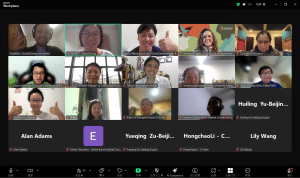By the late 20th century, the proportion of the Chinese population aged 60 and above exceeded 10% for the first time. Despite the size of its population, China’s age structure indicates that the country has clearly entered the ageing stage, and the elderly care sector has attracted much attention from both the government and the public. Over the past year, some of the measures taken to fight Covid-19 have brought the “digital divide” between the elderly and the rest of the population in to stark relief. Relying on the spread of mobile technology, the Chinese government introduced a colour-based “health code” system to detect people who are considered at risk of spreading the virus. A simple click on a mobile application automatically generates a coloured code in green, yellow or red – each indicating the person’s health status over the past 24 hours. Showing a green health code is now necessary to enter most public places and even to buy bus and train tickets in many parts of China. However, for the many elderly people who do not own smartphones or find them hard to use, this system can pose a real problem.
Recently the National Committee on Ageing, one of the “advisory and coordinating organs” under the State Council, published a plan entitled “Artificial Intelligence Helping the Elderly”, with the purpose of solving the problems faced by the aged population when using smartphones and other new technologies and the relevant services. The plan mentions that a huge number of elderly people do not use new technologies such as smartphones in their life, with reasons including that they do not know how to use smartphones, they are scared of new technological devices, they tend to avoid new things including smartphones and they cannot get access to smart devices. It is urged that solutions to deal with these problems have to be initiated quickly, as the internet and other new technologies have penetrated into the whole of society and many social services have switched from manual mode to operating through smartphones. Being unable to use smartphones will inevitably cause much inconvenience to the life of the elderly. A number of incidents have happened in different locations where elderly people did not know how to scan the QR code to buy tickets for the bus service, and most recently, an elderly man was rejected by a bus driver because he did not have the health code indicating that he was safe from Covid-19. While prompting elderly people to gain the courage to use smartphones and teaching them how to operate them are important, the Committee also stresses that manual services need to be set aside for elderly people in supermarkets, hospitals, and public transport because the fact is that not all elderly people can access the internet and smartphones.
According to statistics from the China Internet Network Information Center (CNNIC), by June 2020 the number of internet users had reached 94 million, but users aged 60 and above were only 10.3%, in other words there are merely 6.982 million elderly people who use the internet. Data from the National Bureau of Statistics show that the population aged 60 and above is 25 million, so in fact more than 60% of elderly people in China do not use the internet. This means more than 60% of senior citizens in the country are not able to obtain timely and effective information and enjoy the convenience of online shopping, ticket purchasing and other services. In situations where services can only be obtained through the internet and smartphones, the elderly population will face great difficulties.
The main reasons behind this internet poverty phenomenon among elderly people, suggests the CNNIC, include lacking knowledge of the internet, low literacy levels and insufficient accessible internet facilities. A survey from the CNNIC shows that 48.9% of non-netizens report that they do not use the internet because they do not have enough knowledge about computers and the internet, 18.2% report that they cannot type pinyin and therefore are not able to search on the internet for things they want, while 14.8% report that they do not own devises which can facilitate them to access the internet.
For many elderly people, their children will purchase smart devices for them, but once they get the devices other problems emerge. For example, when their children are not nearby, elderly people may not know how to switch on devices or use smartphones apps to get information or services.
In order to eliminate the internet access gap between elderly people and other age groups, the National Committee on Ageing published an Announcement which demands five specific actions to help senior citizens get familiar with and use smartphones. Firstly, relatives, community service staff, volunteers and colleges for senior citizens should help teach elderly people how to use smartphones. Secondly, assistance is needed to help elderly people realise and avoid online frauds. Thirdly, technology and internet companies are encouraged to create smartphones that are friendly to senior citizens, for example, smartphones with a one-click function. Fourthly, fundraising events are encouraged to be organised with the aim of helping some elderly citizens afford smartphones. Last but not least, the announcement once again emphasises that some manual services must be provided in public spaces for senior citizens who do not use smartphones yet.
Meanwhile, the Ministry of Industry and Information Technology and the China Disabled Persons’ Federation co-published the Guiding Opinions on Advancing Information Accessibility, which advocate preferential policies for people aged over 60 and people with disabilities, offering them financial support to access the internet, mobile phones and smartphones. The target is that by the end of 2021, people over 60 years old and the disabled will enjoy significant benefits from the new communication technologies with affordable prices. In addition, the Opinions encourages companies to develop smart package products to facilitate the targeted groups to use the internet and smartphones more conveniently.
Social organisations and social workers have also active reacted to the need for people of advanced age to understand and use new technologies. For example, as early as 2011, the Beijing Xiyang Zaichen Social Work Service Center began to organise young university students as volunteers to enter different communities, teaching the elderly to learn about computers, smartphones, online shopping, virtual reality videos and so on through seminars and one-to-one sessions. Nowadays, training the elderly in internet access and smartphone use has become a standard feature in an increasing number of social organisations, community centres and colleges for the elderly.



